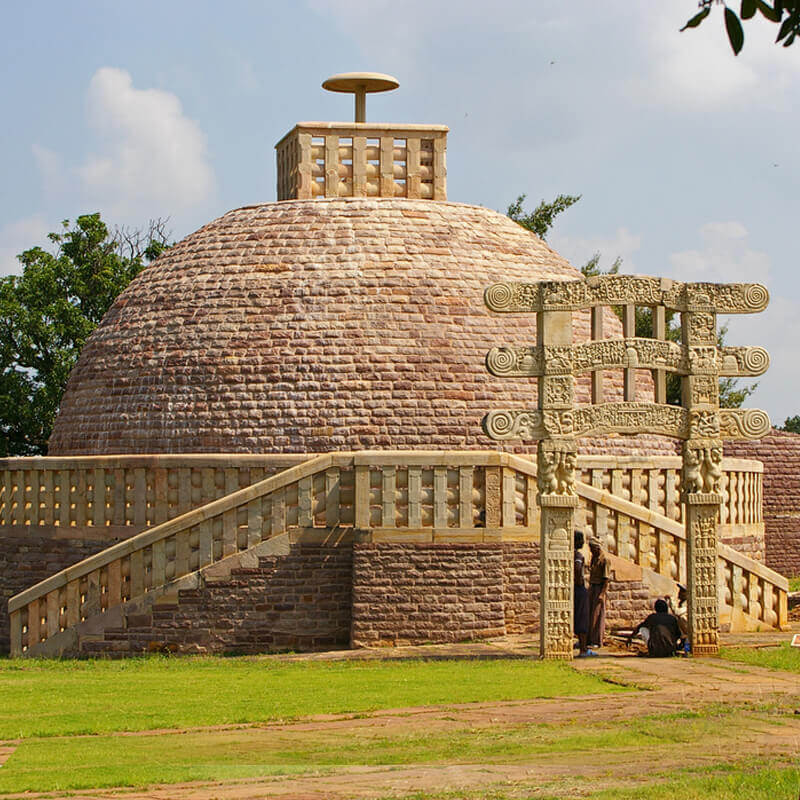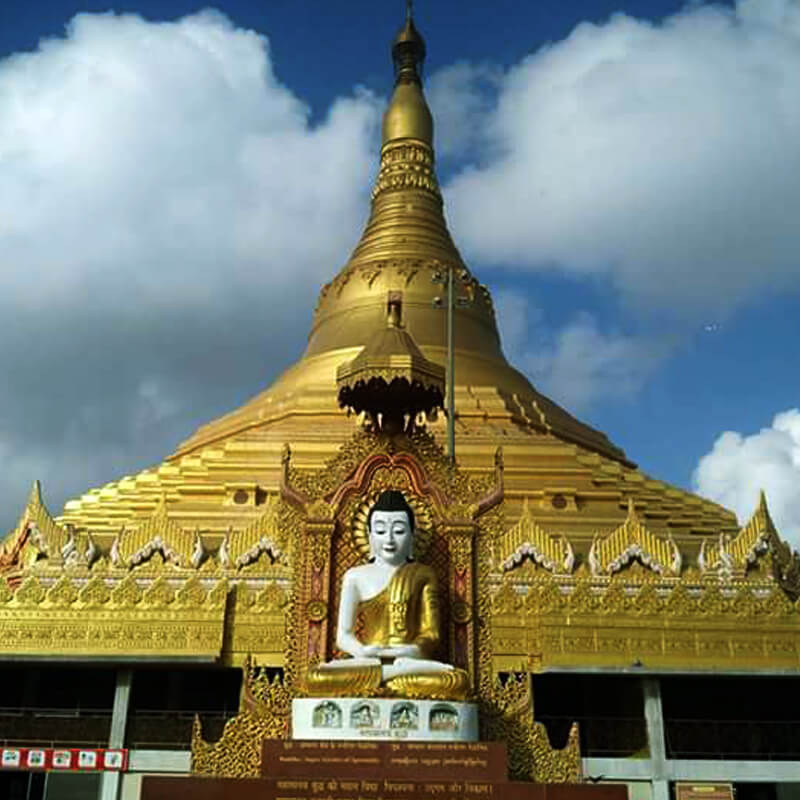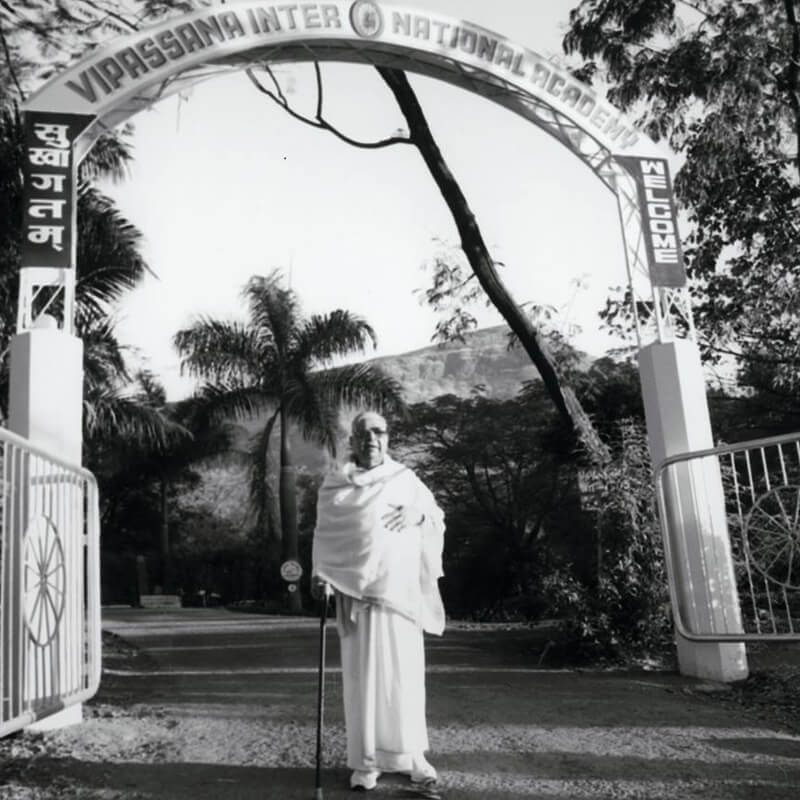Goenkaji and Mataji left the Charlotte Hindu center in the morning of 14th May and reached Stone Mountain Park, Atlanta in the evening. On 15th May, Goenkaji granted a telephone interview to James Shaheen of Tricycle magazine. Later, Goenkaji and Mataji came for a short mettā session with the assembled meditators. In the evening, Goenkaji gave a talk at the Glenn Memorial United Methodist Church at the Emory University. "Jesus Christ is a prince among saints. Jesus had love and compassion for the very people who tortured him to death. This indeed is a sign of a true saint. Vipassana helps one to imbibe the qualities of Christ in one's life. Vipassana practice involves nothing but the truth that one experiences from moment to moment." Quoting the Bible, Goenkaji said, "You shall see the truth and the truth will make you free."
Many questions about Vipassana came from the audience. In response to a question about why one needs Vipassana when one is already happy, Goenkaji asked, "Don't you want to be be happier?" Then he went on to explain how one is not aware of one's misery. It is like a piece of charcoal that remains hot though it appears cool because it is covered with ash. Similarly, people fool themselves and fail to recognize their dissatisfactions, frustrations, anxieties, and fears. How can one be happy when the mind is continually defiled by impurities such as anger, hatred, jealousy, fear, anxiety and greed? Vipassana does not just make you aware of these impurities but it starts eradicating them.
Goenkaji visited the Donaldson Correctional Facility at Birmingham on 16th May 2002. It was the last day of the second course there. He was welcomed at the gates by Dr. Debra Marshall, the prison psychologist who had taken a ten-day course earlier at Dhamma Dharā, VMC. Goenkaji first went to the prison gymnasium that had been transformed into a temporary meditation hall for both the courses. Students from both the first and second courses were meditating there. Goenkaji expressed joy at being able to visit the meditators in prison. At the end of the group sitting, he told them that, apart from their own liberation, they were setting a good example for fellow inmates who would also be inspired to give a trial to Vipassana.
After the brief talk to meditators, Goenkaji met prison officials including Director of Programs (Dept. of Corrections) Dr Cavanaugh, prison warden Mr. Bullard, Deputy Commissioner Mr Hardison and Dr Marshall. Ms Phillips of Lion Heart Foundation also joined the meeting. Goenkaji expressed appreciation for the initiative taken by these officers to organize Vipassana courses in the Donaldson Correctional Facility. Criminals are sent to prison with the aim of correcting their behaviour but after spending time in the punitive and crime-infested environment of prison, they often turn into hardened criminals. For a prison to become a truly correctional facility, the inmates should be given tools to reform themselves in order to become honourable members of the society. Dr. Marshall described the previous week as a 'sensational' week in the prison. She asked three meditators to talk about their experiences in the Vipassana course.
Leon Kennedy sat his first Vipassana course in January 2002 and served the second course. He described his experience of sitting the course as opening the mind and that of serving the course as opening the heart. Eli Crawford said that Vipassana meditation was very much needed in the prison and he was very thankful for receiving this invaluable gift. Rick Smith said that he had been incarcerated for 22 years. He had found plenty of time to deal with many issues and had forgiven everyone. But he had never been able to forgive himself and had kept running away from himself all these years. Finally, Vipassana forced him to look inward and to face his inner self. It was the most difficult task he had ever undertaken but it gave him unparalleled courage and immense clarity to come to terms with the present reality.
Goenkaji then gave a brief talk to meditators, prison staff and some selected inmates who had not yet taken a Vipassana course. He said that people both within the walls of the prison as well as outside the walls are prisoners of their unwholesome habit patterns. All keep reacting with negativities such as anger, fear, hatred, jealousy, greed etc. Vipassana liberates one from the prison inside. After Goenkaji's inspiring address, inmate meditators asked him questions about their practice.
On 17th May, Goenkaji flew to Houston from Birmingham on a morning flight. Immediately on arrival, he met some local expatriate Indians. Among the guests were Mrs Najma Heptullah, the deputy chairperson of the Rajya Sabha and the Consul of the Indian Consulate in Houston. In the evening, Goenkaji was interviewed for a radio show. Later, he gave a talk at the Adam's Mark Hotel. More than 800 people turned up to listen to Goenkaji and additional chairs had to be placed in the hall. After the talk, Goenkaji travelled to the Southwest Vipassana Center, Dhamma Sirī. This was Goenkaji and Mataji's first stay at a center in North America during the Meditation Now tour.
Goenkaji inspected the facilities of Dhamma Sirī during his morning walk on 18th May. Later, he met two senior assistant teacher couples who continue to serve on many courses in spite of their advanced age and attendant illnesses. Then Thomas and Tina Crisman, teachers in-charge of Dhamma Sirī, introduced the new trustees to him, mostly young people. Thomas said, "Goenkaji, this is the future of Dhamma Sirī." Goenkaji remarked, "Yes, it is good to see that young people have come forward and are taking more and more responsibilities." After the meeting with the trust, he gave private interviews to many meditators. In the evening he came to the Dhamma Hall again for a question and answer session. Goenkaji met with meditators individually and in groups at Dhamma Sirī in the morning of 19th May. In the evening he gave a public talk at the beautiful Sara Ellen & Samuel Weisfeld Center in Dallas.
The Caravan left the center the next morning. It would take the Caravan three days to reach Denver. In the morning of 22nd May, Goenkaji and Mataji went to the nearby dormant Capulin Volcano. All remembered Goenkaji's simile of sleeping volcanoes for anusaya kilesa (latent mental impurities). The Caravan reached Boulder, Colorado in the evening where Goenkaji met local assistant teachers and hosts for a short while.
On 23rd May, Goenkaji was invited to speak at the Economic Club of Denver, which met at the Westin Hotel in downtown Denver. He spoke about his own experience before and after Vipassana. Before he started practising Vipassana he was an ambitious and miserable businessman. He used to become very unhappy if he lost a business opportunity or a contract. The misery was greater if the contract went to his competitor. He began to suffer from insomnia. However, when he succeeded in getting a big business deal, he again suffered from sleeplessness because he became so excited! He would stay awake making future business plans. Goenkaji was very successful in his business but it resulted in great misery. Furthermore, he did not keep this misery limited to himself. He was a very angry person and his family would often face his anger for no fault of theirs. After his first Vipassana course, he found a technique that not only helped him to become a peaceful and happy person but also made him a much more efficient businessman as well as an effective administrator. His sharp and balanced mind made quick and correct decisions. And after hours of work, he still felt fresh. Goenkaji ended his talk by exhorting the business executives to give this non-sectarian technique a trial for ten days.
The question about how to deal with terrorism was bound to come up after the 11 September attack on the Twin Towers. This question came after Goenkaji's talk on 24th May in the huge ballroom of the Westin Hotel in Westminster filled to capacity with people from the Boulder and Denver areas. He explained that it is the responsibility of the government to look after the security of its people. All responsible citizens must help in this task to the best of their ability. However, though the government is responsible for security, each person must address the issue of fear within oneself. The biggest safety is the safety within; the biggest security is the security within. Earlier, Goenkaji explained how fundamental human values are an essential part of every religion. Without this universal spirituality, a religion becomes an empty vessel from which the nectar has leaked out.
He was asked, "How does one deal with illness using Vipassana?" Goenkaji explained that illness is as much a part of human existence as birth, old age and death. One must seek proper treatment for one's disease. Vipassana may help in some diseases directly if the disease is psychosomatic. Even when the illness is purely physical, Vipassana is a big help because one learns to face the illness bravely and to maintain equanimity in the face of unpleasant sensations. There are many cases where a serious Vipassana meditator facing the pain of terminal cancer takes medicines that do not affect the alertness of the mind but refuses medicines that cause sleepiness. The meditator knows that death is imminent and wants to stay awake and alert to face death with equanimity. Vipassana makes one courageous.
Regular group sittings as well as one-day courses have been held in Boulder for the last few years. The local organizers planned a one-day course on 25th May. Goenkaji had a busy morning schedule that day and therefore decided to go to the one-day course site only to answer questions from meditators on the course. On the way to the course site, Mataji suggested that Goenkaji could take his lunch later so as to enable him to give Vipassana. Goenkaji's assistants were hesitant but the issue was decided when Goenkaji said that the gift of Dhamma is the greatest gift and so he wanted to take the opportunity to teach Anapana or Vipassana whenever time and health permitted. He decided to give Vipassana to the one-day course students.
Goenkaji answered questions from the meditators before giving Vipassana. One woman narrated that she had been suffering from depression for a long time and that Vipassana had helped her to come out of it to a great extent. Goenkaji explained how to keep working at the level of sensations with the understanding that both the sensations and the depression are impermanent. A meditator commented that there is an apparent contradiction between effort and effortless observation. Goenkaji said that one must make efforts on the path of Dhamma but one should do so without generating tension. One should keep checking whether one is becoming tense. In the beginning, one finds that one keeps generating tension in an effort to work hard but slowly one learns to maintain constant awareness and alertness with a relaxed mind. There should be no effort to create or generate sensations but there has to be effort to maintain continuous awareness of sensations with equanimity. Thus, it is an effortless effort.
Many students practise Vipassana as well as yoga. Goenkaji was asked which one should be practised first in the daily routine. He said that it was an individual choice. Yoga and Vipassana are compatible, even complementary. However he cautioned Vipassana meditators not to mix meditational aspect of yoga with Vipassana, just as mantra should not be mixed with the practice of Pranayama.
Students often meet Goenkaji just to express their gratitude. He simply replies, "Thank Dhamma." Sometimes he adds, "Thank yourself for taking time to practise and to make efforts on the path of Dhamma." After the question and answer session, Goenkaji gave Vipassana.
The next day, Goenkaji went to New York to speak at the official Vesakha celebrations at the United Nations.
Goenkaji met various people including assistant teachers and old students on 27th May and gave guidance on administrative matters. He also answered messages from various Vipassana centres and teachers from all over the world. He was able to take his walk both in the morning and evening-something that was not always possible due to his busy schedule on the tour.
On 29th May, Goenkaji gave the keynote speech at the Celebration of the International Recognition of the Vesakha at the United Nations, which honours the birth, enlightenment and final passing away of the Buddha. This year, the event was hosted by the Permanent Mission of the Union of Myanmar to the United Nations. Ambassadors of the Permanent Missions of Sri Lanka, Cambodia and Myanmar spoke briefly before Goenkaji's keynote speech.
The talk, entitled, "Buddha, the Super Scientist of Peace", was given at the Dag Hammerskold Library Auditorium to an audience of Ambassadors, other U. N. dignitaries and associates, venerable monks and a few Vipassana meditators. Putting the teaching of the historical Buddha in a modern perspective, Goenkaji said, "The world is afflicted with the malady of hatred, anxiety and fear. It needs a remedy from an extraordinary physician. The Buddha was such a physician, a great physician of peace and happiness. His teaching of peace and harmony is as relevant today as it was twenty-six centuries back, when he set in motion the Wheel of Dhamma, the Wheel of Peace. Indeed, it is more relevant today. We have gathered here this afternoon to honour the teaching of this outstanding person in human history. Let us see how his teaching uproots the negative emotions that are at the root of cruel violence and how these can be changed to positive compassion. Often, blind beliefs and strong attachment to one's views cause negativities that, in turn, produce such atrocities."
He emphasized that there has to be peace within individuals for peace in the society. There has to be peace within for peace outside. He explained how the Buddha had discovered the roots of misery and the way out of it. "When one is working with sensations, one is working at the depth of mind. Whatever arises in the mind is accompanied by sensations on the body-Vedanāsamosaraṇā sabbe dhammā. Every thought that arises on the mind is accompanied by a sensation on the body-Vedanāsamosaraṇā saṇkappavitakka. This was a great discovery of the Buddha… Another great discovery of the Buddha was that we generate taṇhā in response to vedanā (sensations)."
Goenkaji explained further, "When one observes sensations objectively, one starts coming out of ignorance. By understanding the impermanent nature of sensations, one generates paññā in response to vedanā. This is the law of nature. Dhamma niyāmatā is the law behind the natural order of phenomena. Buddha or no Buddha, Dhamma niyāmatā remains. The law is eternal. This is the bold declaration of a supreme scientist. Just as whether there is a Newton or no Newton, the law of gravity remains true. Newton discovered it and explained it to the world. The Buddha says, 'I have experienced this Law of Nature, the Law of Dependent Origination, within myself; and having experienced and understood it I declare it, teach it, clarify it, establish it and show it to others. Only after having seen it for myself, I declare it.'"
The talk was extremely well received by the entire audience. Later, at a reception at the United Nations Penthouse, many of the diplomats came to meet Goenkaji and enthusiastically expressed their understanding and agreement with Goenkaji's address. Many diplomats had heard about Vipassana from their friends and relatives. One ambassador came to Goenkaji and said that he had not been aware that Goenkaji was going to speak at the Vesakha celebration and hence had not informed his wife, a Vipassana meditator, about it. He joked that he would have to face his wife's displeasure for not having informed her. He told Goenkaji that he would take a ten-day course soon. The Indian Ambassador to the United Nations also met Goenkaji after the talk. Goenkaji returned late that evening, tired but satisfied that there were signs that the world was taking heed of the eternal teaching of the Buddha.
Goenkaji flew early the next day from New York to San Diego. In the evening, he met with the teachers responsible for the spread of Vipassana in the People's Republic of China.
The next morning, Goenkaji talked to the producer of a National Public Radio show to discuss the interview they planned to air in a couple of days. In the evening, he gave a public talk in the Montezuma Hall at San Diego State University. He emphasized that all the expatriates who have come to the USA recently must be faithful to this country. They should make sure that none of their actions are in any way harmful to the people of this country. To a question as to why Buddhism was driven out of India, he replied, "Because it became Buddhism!" There are a few people who use the word "Buddhism" to mean the Buddha's teaching without any sectarian connotation but for the majority Buddhism is an organized religion. Goenkaji explained how India forgot the Buddha because his practical teaching of Vipassana was corrupted and ultimately lost.
The Dhamma Caravan left San Diego in the morning of 31st May to travel to Irvine where Goenkaji gave Vipassana to students sitting a one-day course. The course was organized in a Mormon Church. He also answered questions from the meditators. One student wanted to know about one's progress in meditation and about various attainments. Goenkaji replied that the main yardstick of progress on the path of Dhamma is whether one's life is improving, whether one is living a more peaceful and happy life.
In response to a question on Kundalini, Goenkaji explained that after the Buddha's practical teaching was lost in India, there was still talk about some of the experiences one has in Vipassana. There was some talk about sensations. So new practices started in an effort to get sensations. These attempts could enable them to feel sensations only on certain points, called chakras, on the spinal cord where one feels sensations easily. But there was no understanding of the impermanent nature of these sensations and no effort to maintain equanimity. Therefore these practices did not eradicate the saṇkhāras, rather they reinforced the conditioning of craving. When a student came and said, "Thank you for your teaching." Goenkaji quickly corrected her, "It's not my teaching; it is the Buddha's teaching".
In the evening he gave a public talk at the same venue. This talk was simultaneously translated into Chinese. Goenkaji told the story of the Bodhisatta who went on to become Gotama the Buddha. Siddhartha had learned various absorption practices (samādhis) after he left home to search for a way out of the suffering inherent in existence. All these practices, which merely concentrated the mind using one object or the other, gave him some calmness and some purity of mind. The ascetic prince found that in spite of practising the highest levels of samādhi, he was still not able to remove the impurities lying deep inside. He then practiced various austerities including fasting that made his body a mere skeleton with the belief that torturing the body would purify the mind. He found that this extreme self-mortification did not help to eradicate impurities in the mind. Therefore, he stopped these severe austerities and, through the practice of Vipassana that he rediscovered himself, he attained enlightenment. We are all fortunate that this path, Vipassana, is available to us in its pure form because it was preserved in its pristine purity in Myanmar. Let us all use it to get liberated from the bondage of the defilements.
After the public talk, the Caravan travelled to the Burmese monastery in Azusa and reached there around midnight. The volunteers in the Dhamma Caravan felt completely at home in the Burmese monastery. The venerable monks there were extremely hospitable. The Burmese lay people who support the monastery were also very helpful. Goenkaji paid respects to the Sangha in the morning. In the evening he gave a public talk at the Wadsworth Theatre in Brentwood in Los Angeles. He explained how Vipassana is an art of living a happy and peaceful life, good for oneself and good for others. The lively talk had the audience laughing from the very beginning. Later, the audience listened in rapt attention to Goenkaji's explanation of Vipassana as a pure science of interaction of mind and matter.
One person wanted to know the place of sex in married life. Goenkaji replied that physical relations with a single partner is not breakage of precepts and not harmful. However, if one keeps changing partners in a search for more and more sensual pleasure, one gets engulfed in the fire of passion and remains agitated and miserable all the time. Someone asked, "If I don't react how can I have any fun in life?" Amid laughter in the audience, Goenkaji replied that it is all right to have fun in life. But one should be sure that one is really enjoying life. For this, it is important that one has no attachment to sensual pleasures and does not become miserable when one misses them.
(to be continued)






